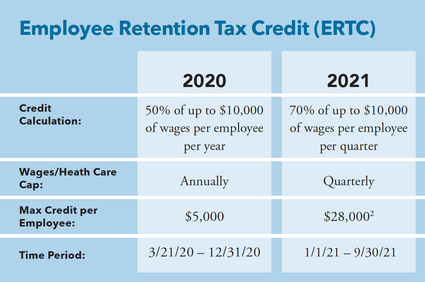 Since its rollout last year, ORLA has consistently reported on the potential benefits of the Employee Retention Tax Credit (ERTC). The benefit is still available but time, and patience, is critical. Application for ERTC is open to any qualified employer who has filed a 941 tax form from March 12, 2020 (when the program started) through September 30, 2021 (when the program ended). This credit helps any qualified employer– not just restaurants and lodging operators– put their hard-earned money back into operations. Just ask John Barofsky, current ORLA Chair and co-owner of Beppe & Gianni’s Trattoria in Eugene. “Being a small independent operator, the ERTC was an unexpected but welcome boost to my operation’s ability to stay open and maintain staff through the pandemic. Although at first the process of the credit seemed daunting, the time I spent was well worth the return. The ability to defray payroll costs and tax payments had a great impact on my cash flow and bottom line.” Another ORLA member who benefitted from ERTC is Drew Roslund with the Overleaf Lodge & Spa and The Fireside Motel, both in Yachats, Oregon. “The ERTC was comparable in size and scope to the Paycheck Protection Program for many organizations. It was tough waiting seven to eight months for refunds but just knowing that we qualified gave us enough confidence to keep team members employed and increase wages, especially during the busy summer season on the Oregon coast. Roughly the equivalent of a month’s worth of gross revenue, we were able to lock in some necessary incentive pay for key staff and even tackle a few deferred maintenance projects.” To review, the original ERTC program was enacted by the CARES Act in 2020 and allows a tax credit of up to 50 percent of each employee’s share of social security qualified wages, per year. With the Consolidated Appropriations Act of 2021, the ERTC program was expanded to allow a tax credit of up to 70 percent of each employee’s share of social security qualified wages, per quarter. The 2021 Act added a 500-employee maximum [1] for employers who could access the ERTC program. As of this writing, the final change in the ERTC storyline came with the passage of the Infrastructure Investment and Jobs Act in 2021, which terminated the ERTC on 9/30/21, instead of terminating on 12/31/21. That last change effectively repealed an employer’s tax credit for Q4-2021, but ORLA members are strongly encouraged to research and apply for all ERTC benefits that are due to you. Even though the program ended one quarter earlier than originally planned, ERTC is available to qualified employers and wages for a portion of seven quarters - March 12, 2020, through September 30, 2021. Employers that did not claim the ERTC on their original Form 941 may retroactively claim the credit by filing Form 941-X. It is important to note that employers have three years from the date the original return was filed, or two years from the date the taxes were paid, to file Form 941-X and claim the full credit. Two areas of caution for operators: First, with the high volume of ERTC applications pouring in across all industries, it is not uncommon to wait nine months or more for refunds to be processed and received. Second, for those operators who applied for and received a tax credit for Q4-2021, the repeal of ERTC for that particular quarter triggers a negative situation where employers that already claimed an advance payment of the credit for wages paid after September 30, 2021 and received a refund on those wages must repay that refund. Employers that held back payroll tax deposits for Q4-2021 in anticipation of the ERTC for that period must deposit those amounts retained on or before the relevant due date for wages paid on December 31, 2021 (regardless of whether the employer actually pays wages on that date).[3] Note, this article serves as a general guideline and should not be construed as tax advice. Owners/operators should always seek their own tax counsel to take full advantage of accounting treatments, including ERTC, that minimizes tax liability and maximizes tax credits and refunds. If you are looking for assistance with this process, consider reaching out to Adesso, a new ORLA partner helping industry members navigate the complex and time-consuming ERC filing process. Visit AdessoCapital.com/ORLA for more information or contact your ORLA Regional Representative. You can also listen to ORLA's Boiled Down podcast episode #41, ERC: How to Get the Money You May Be Owed. ORLA hopes you are able to join many other operators who have found profitable results from the Employee Retention Tax Credit program. Good luck and many happy returns. | Tom Perrick, Advocate for the Hospitality Industry This article originally appeared in the Spring issue of Oregon Restaurant & Lodging Association Magazine, pg. 16. 1 How To Claim The Employee Retention Credit For The First Half Of 2021, Journal of Accountancy, April 5, 2021 2 Tri-Merit, LLC 2021 3 BDO U.S., For Employers Who Took ERTC for Fourth Quarter 2021 Wages, December 2021).  Food Scrap Policy, Customer Entitlement, and March Madness Business Food Scraps Policy In Play – Implementation of a regional food scraps separation requirement went into effect March of this year and many businesses within the Portland Metro boundary will need to comply by 2023. Originally scheduled to begin in March 2020, the requirement was delayed by two years due to the impacts of COVID-19 on the region’s residents and businesses. The earliest any business must be in compliance is March 2023 and all businesses generating more than one 60-gallon roll cart of food scraps a week must be in compliance by September 30, 2024. View more information about the requirement and how to access resources for implementation on Metro’s website at Oregonmetro.gov/foodscraps. Multnomah County Candidates Forum April 20 – There continues to be a lot at stake in Portland with how we are managing safety and security issues as we start getting a taste for what Spring and Summer looks like in the Portland region with the activity surrounding March Madness. Some of you are seeing sales numbers returning to acceptable levels as of this month for the first time in a long time. One of our goals is to not let our elected leaders off the hook in understanding the significance of our debt loads just to get to the point where we could be open and start seeing customer demand improve again. ORLA is co-hosting along with several other business organizations an upcoming forum on April 20 focused on Multnomah County Commissioner candidates. Visit Portland Business Alliance's website for details. OTLA 3rd Year Class Launch – This past week the 3rd year class for the Oregon Tourism Leadership Academy (OTLA) gathered in Sunriver immediately following the Oregon Governor's Tourism Conference. ORLA had the chance to sponsor one of the keynote sessions at the Conference and showcase a new promotional video to bring more awareness to the Oregon Tourism Leadership Academy and opportunities for tourism professionals to get more involved in the program. Subscribe to updates on OTLA and view the new video. Customer Entitlement? – A 2022 pilot study from OSU Cascades Hospitality Management program shared by the program's director, Todd Montgomery, confirmed what they have been hearing during focus groups and personal interviews for years: entitled customer behavior is getting worse, and it is impacting the desire of hospitality workers to stay in the industry. OSU Cascades will present a white paper on all of their results in the coming months where they will address workers perceptions of what is driving these customer entitlement events. In the meantime, you can view their latest infographic. Learn more about how the Oregon Restaurant & Lodging Association is protecting and promoting Oregon's hospitality industry at OregonRLA.org. Below are some highlights from the 2022 Regular Session. A more comprehensive list of bills ORLA tracked can be found in the Bill Tracking Report.
SB 1514 – Pay Equity Originally a placeholder bill, ORLA monitored this bill as it became a vehicle to extend the ability of employers to offer hiring and retention bonuses. Because of the pandemic and government shutdowns of Oregon restaurants, many operators found themselves needing to offer hiring and retention bonuses to staff or prospective staff. The extension allows for businesses to continue to offer these bonuses without running afoul of Oregon’s Pay Equity Law until September 28, 2022, or 180 days beyond the expiration of the Governor’s Emergency Declaration which occurs April 1, 2022. HB 4015 – Entrepreneurial Loans ORLA supported this bill to help expand eligibility for state entrepreneurial loans and raise the per-loan limit from $500,000 to $1 million. This bill passed and was signed by the Governor on March 2, 2022, becoming effective immediately. HB 4101 – Smoking Bill ORLA initially opposed this bill which would have increased the distance from businesses at which someone could smoke from 10 to 25 feet. After an amendment in the House excluding OLCC-licensed businesses was passed, ORLA was neutral on the bill, but it died in the Senate. HB 4152 – Franchise Bill This was essentially the same bill that was introduced last session. ORLA opposed this bill which, among other provisions, would have allowed franchisees to use the brand name but nothing else related to the brand identity, quality, or reputation. Although the bill died in committee, we do expect the bill to return in the future and there is the possibility an interim legislative session committee or workgroup might review this issue. HB 4153 – Creative Opportunity Fund This bill established an “Opportunity Fund” equal to a dedicated two percent portion of the overall Oregon Production Investment Fund (OPIF) each year that could then be used for workforce development, employment training and mentorship, project and filmmaker grants, content and creator development, small business and regional production development, amongst other things. ORLA supported the bill for the economic and tourism opportunities available when these investments occur. The bill passed the House and Senate and as of this writing, was waiting for the Governor’s signature. Questions? Contact ORLA Director of Government Affairs, Greg Astley.  Guest Blog | Togather Restaurant Consulting Gen Z is the first generation to have been raised entirely in the digital age, and there are numerous ways they are changing the world around them because of it. They’re buying more vegetarian and plant-based products, they’re eating local and fresh ingredients, and they’re ordering everything off of their phones. While we still have quite a few years before Gen Z generates their own buying power, we should look at their trending needs now so we can better understand this emerging market. Let’s talk about what it means to be raised in the late 90s and early 2000s. These people recall 9/11, the wars in the Middle East, and the economic crash of 2008 as their earliest childhood memories. Whether through reports on climate change, economic crises, or pandemic response, the people in this group have been raised in a tumultuous time. They are looking to change how humans function in society. These young people have hope in their eyes for a better future, and this affects how they interact with the world around them. Gen Z is more likely than any other generation to eat a vegetarian meal. Why is that? Statistics have shown that the meat industry is distressing the environment and incredibly expensive. Both the farming of meat and its transport have impacted this. Being raised in an era of political documentaries and environmental awareness, this generation is keenly cognizant of their personal consumption and its impact on the world. Therefore, they’re more willing to replace a meal with a vegetarian option if it means reducing their carbon footprint even the barest amount. So, let’s look at making tastier meatless meals. Great strides have been made in the meat-replacement market. We now have meat-replacement products that bleed hemoglobin-adjacent proteins so that you’re not losing that bit of flavor when you’re chowing down on a plant-based burger. Products like this are selling very well. Having these options excites Gen Z, and they’re willing to dole out an extra $2 for a meat replacement product. Small efforts can be made to integrate these products into your menu, all while easing the minds of a generation that cares about the impact of their dietary habits. Eating locally is also at the forefront of their minds. Gen Z is 75% more likely to eat from a restaurant that advertises locally-sourced ingredients (Source). There are a lot of factors for this, but the most glaring ones are the impact that cross-country distribution has on the environment, and the fragility of that supply chain became self-evident during the Covid-19 pandemic. From a young age, these people have had fuel emissions and carbon footprints on the brain, so it makes sense that they would be hyper-aware of how far their food traveled to get to them. Thankfully, food distributors have made it easier for us to shop locally – even large distributors can connect you with regional goods. Being raised completely submersed in technology has also impacted Gen Z. Many were toddlers when the first iPhones came out, and now their phones are permanently in their pockets. They don’t go anywhere without them, and the rest of the world isn’t too far behind. This has made dining out a completely different experience than we ever anticipated. Today, QR codes are quite common in restaurants and Gen Z has been the number one fan of this ordering system as of late. While some people prefer a more traditional approach to dining out, this generation is likely to opt for this human-less route of food ordering and delivery. Some restaurants are even looking at automatic food runners to cut down on labor as well. With this understanding of Generation Z, let’s take a look at implementing these changes in your business. We don’t need to anticipate Gen Z dominating the market for a few years, as most of their buying power is sourced from parents and guardians. We won’t see major shifts in our market until they transition fully into independent life. Slating gradual changes to accommodate them, starting now, will put your business a step ahead of the times. Adding vegetarian meals to your menu, sourcing your ingredients locally, and using the labor-saving advantage of QR code ordering are great ways to draw the eye of this generation. Though young, Gen Z spent $111 billion on eating out in 2021 (Source), and that’s without factoring in alcohol sales. This market is only going to become more viable as Gen Z continues to grow – and we should be prepared to tap into it. | Kate Ratledge, Togather Restaurant Consulting This guest blog was submitted by Togather Restaurant Consulting. For more information on guest blog opportunities, contact Marla McColly, Business Development Director, Oregon Restaurant & Lodging Association.
 This week, Congress finally reached a bipartisan agreement on their annual spending bill. However, the agreement is silent on replenishing the Restaurant Revitalization Fund (RRF), meaning no new funds will be directed to complete the mission and fund the 177,000 applications still pending. Over 2,500 of those applications still pending are here in Oregon. We are waiting for the dust to settle in Washington to identify if there are other avenues to replenish this much-needed program. Unfortunately, this decision from Congress is a huge blow to our efforts and the path forward is very uncertain. From the start of this pandemic, ORLA and our partners at the National Restaurant Association have pursued an “all-of-the-above” strategy for the industry, diving into every issue at the federal, state, and local level that could help or hurt us. From cocktails-to-go to worker shortages, we have had a seat at the table for every major policy debate underway and we will continue to advocate on behalf of our industry and its members. You’ll be hearing more from us and the National Restaurant Association on the outlook for RRF, but in the meantime, there are plenty of other issues we will be focused on and we will continue to need your input and your help along the way. If you have any questions, please reach out to your Regional Representative or ORLA Director of Government Affairs, Greg Astley. |
Categories
All
Archives
June 2024
|
Membership |
Resources |
Affiliate Partners |
Copyright 2024 Oregon Restaurant & Lodging Association. All Rights Reserved.
8565 SW Salish Lane Suite 120 | Wilsonville, OR 97070-9633 | 503.682.4422 | 800.462.0619 | Contact Us
Site Map | Accessibility | Privacy Policy
8565 SW Salish Lane Suite 120 | Wilsonville, OR 97070-9633 | 503.682.4422 | 800.462.0619 | Contact Us
Site Map | Accessibility | Privacy Policy

 RSS Feed
RSS Feed


